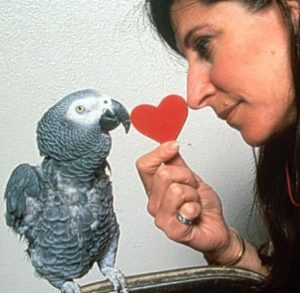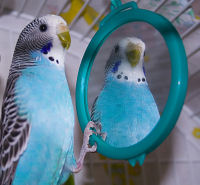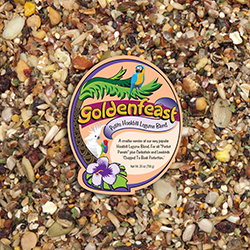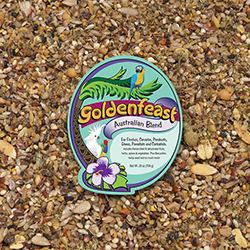
Birds are exceptionally smart and emotional. Don’t be fooled by their little physique. They are intune with their environment and those around them. Here are five ways to best support your fine feathered friend:
1. Spend time with your bird every day.

Any pet needs a certain amount of socialization and bonding, but it is especially important with non-domesticated animals that are being kept as pets. Exotic birds are a perfect example. Birds need to be handled on a regular basis. Neglecting their psychological and emotional wellbeing can lead to all manner of destructive behaviors like feather picking.
There’s an easy preventive measure, though. Set aside a couple hours a day to handle and play with your feathered friend to fulfill their social needs. This will help keep him or well adjusted and feeling good about life. Happy bird, happy owner…win-win.
You can also consider getting them flock-mates if you feel comfortable caring for more than one bird.
2. Make sure to feed a quality, varied diet.
A fresh, balanced diet is crucial to the health of your bird. Bird experts and avian veterinarians have long praised the benefits of feeding parrots lots of fresh fruits and vegetables alongside their standard seed and pellet mixes. Feeding fresh foods not only ensures your parrot is getting the proper vitamins and nutrients but also exposes him to new and different things, which keeps him excited and mentally stimulated.
Don’t forget to always refill their water bowls too!
3. Provide your bird with an enriching cage.

You can’t be at home playing with your bird 24/7. It’s just not realistic. What you can do, however, is make sure that he or she has a comfortable and entertaining place to live while you’re away.
This starts with choosing the appropriate cage for the size and species of your bird. Fill the cage with plenty of enrichments (perches, toys, and other cage accessories) to keep your feathered pal engaged. Keep in mind that birds are much like toddlers in the sense that they will grow bored with the same old toys. Collect various cage enrichments that you periodically switch out to keep their large cage environment sufficiently stimulating.
4. You CAN teach an old bird new tricks…and you should.
This actually applies to birds of all ages. Teaching your bird a few cool tricks is a great way to keep his mental muscles in shape. In fact, birds are more likely to learn quickly from someone they’re bonded to. Teaching your feathered friend tricks is not only great for his brain, but it’s also great for your relationship.
Keep training sessions short, fun, and consistent. Don’t expect too much too fast. With a little patience and lots of practice, you and your bird will be wowing friends and family in no time!
5. Exercise!

Birds, like all of us, need exercise! In the wild, parrots fly, forage, and stay on the lookout for predators. These everyday necessities provide plenty of exercise. However, birds in captivity do not have these opportunities. As a result, bird owners have to make a concerted effort to provide their birds with enough physical exercise.
Providing your bird with physically challenging toys (ropes and ladders, for example), playing games with him or her, allowing plenty of play time outside the cage, and teaching your bird tricks are all ways to make sure your parrot gets the physical stimulation that is so important to his well being.
***
Remember that your bird has special qualities and characteristics. This means what works for a parakeet might not work for an African Grey parrot. What tips do you have to best support your bird’s environment?
Mahalo,
Paco
**adapted from Ofren**
2,722 total views, 2 views today
Five Ways to Best Support Your Bird


